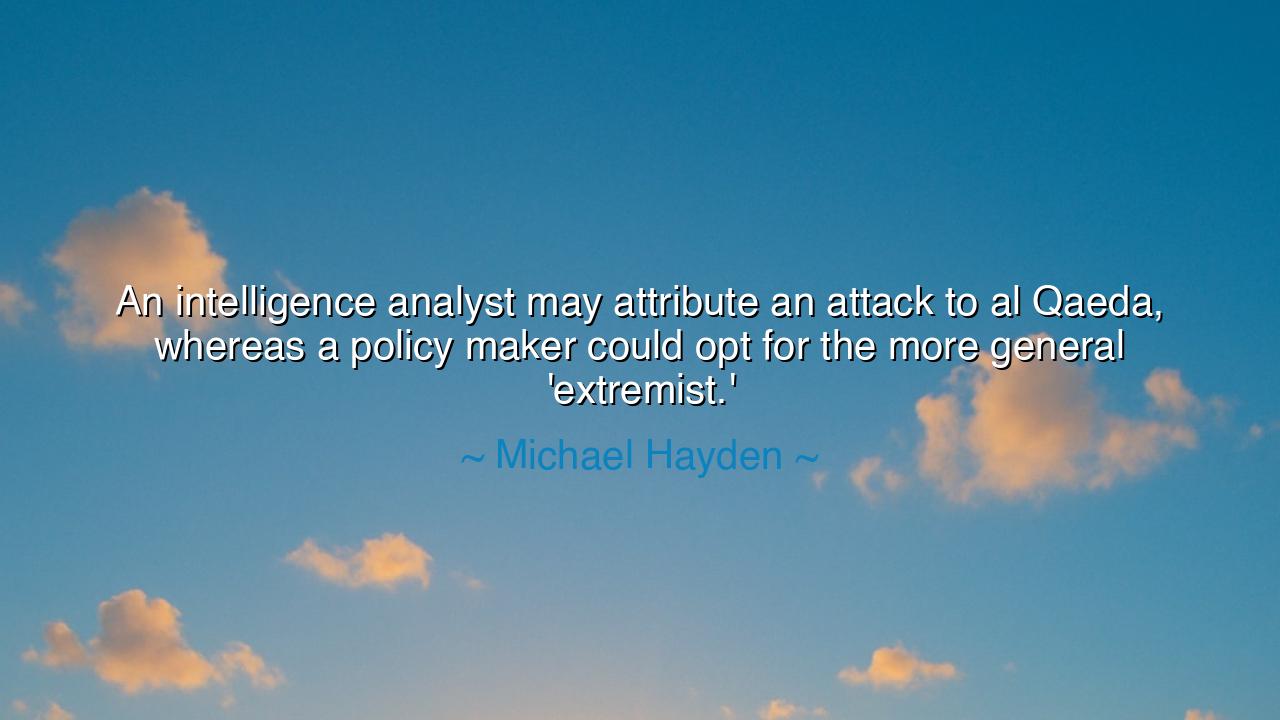
An intelligence analyst may attribute an attack to al Qaeda
An intelligence analyst may attribute an attack to al Qaeda, whereas a policy maker could opt for the more general 'extremist.'






When Michael Hayden, the former Director of both the CIA and the NSA, declared, “An intelligence analyst may attribute an attack to al Qaeda, whereas a policy maker could opt for the more general ‘extremist,’” he was revealing a profound truth about the balance between truth and power, precision and persuasion, knowledge and politics. His words remind us that in the great halls of governance, reality does not always speak with a single voice. The analyst, devoted to evidence and clarity, seeks to uncover what is. The policy maker, burdened by diplomacy, consequence, and perception, must decide what can be said. Between them lies the eternal struggle between the purity of knowledge and the burden of leadership.
To understand the origin of these words, we must look to the world in which Hayden lived — a world shadowed by terrorism, secrecy, and global fear. In the aftermath of 9/11, the intelligence community worked to discern who had struck, how, and why. Analysts, the priests of data and detail, traced patterns of evidence — the fingerprints of al Qaeda, the whispers of communication, the symbols of jihad. But the policy maker, standing before the public and the world, spoke differently. He chose words not of analysis but of influence — “extremist,” a term broad enough to condemn without provoking, to unify without specifying. Hayden’s observation is not criticism, but revelation: it is the natural divergence between those who seek truth and those who must wield it.
This distinction is as ancient as civilization itself. The philosopher Plato, in his allegory of the cave, spoke of the philosopher who sees the truth and the ruler who must manage those still bound by shadow. The philosopher cannot lie, but the ruler cannot always tell the whole truth — for truth, in the wrong moment, can destroy rather than enlighten. So too in the modern world: the analyst, like the philosopher, must deal in precise understanding, while the policy maker must weigh the impact of words upon nations, armies, and hearts. Each serves wisdom in a different form — one in clarity, the other in prudence.
Yet, Hayden’s words also carry a warning. For when language drifts too far from truth, the fabric of trust begins to unravel. If every enemy becomes merely an “extremist,” we lose sight of the root, the pattern, the identity of the threat itself. The danger is not in caution, but in obscurity — for without names, we cannot learn; without distinctions, we cannot adapt. The analyst gives the sword its edge; the policy maker decides when to draw it. If either forgets his purpose, the kingdom suffers — one from ignorance, the other from deception.
History offers many examples of this delicate balance. Consider the Cold War, when John F. Kennedy stood before the world during the Cuban Missile Crisis. The analysts had evidence: photographs, trajectories, warheads. But the policy maker chose his words with surgical restraint, revealing enough to show strength, but not so much as to ignite war. Kennedy’s mastery of both truth and tone preserved peace. Yet decades later, during the Iraq War, the balance was lost — intelligence blurred by political will, truth bent by urgency. From that fracture came years of chaos and mistrust. Hayden’s insight, born of experience, reminds us that truth must never be bent beyond recognition, even when the world demands simplicity.
There is wisdom here for all who seek to lead or to understand. The analyst’s mind is a blade — sharp, disciplined, unwavering — but the leader’s heart must be tempered by compassion, by the awareness that truth and timing are twin forces. Both must learn from the other. The analyst must see beyond data to humanity; the policy maker must resist the temptation to use language as armor against accountability. Only when knowledge and power walk hand in hand can wisdom govern rightly.
So, my child, take this teaching and make it your own: speak truth, but speak it with discernment. Know when to name, and when to frame. Be neither reckless in your precision nor cowardly in your restraint. For every word you choose has power — to enlighten or to obscure, to build or to deceive. And when you stand at the crossroads of fact and feeling, remember Hayden’s lesson: that between the mind that knows and the tongue that speaks, there must dwell integrity. For in the end, the strength of a people lies not only in what they know, but in how they tell the truth.






AAdministratorAdministrator
Welcome, honored guests. Please leave a comment, we will respond soon